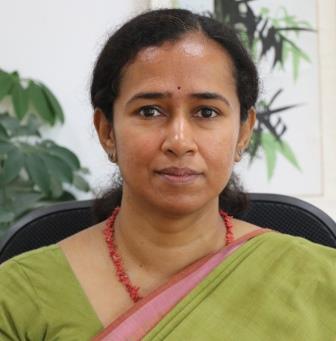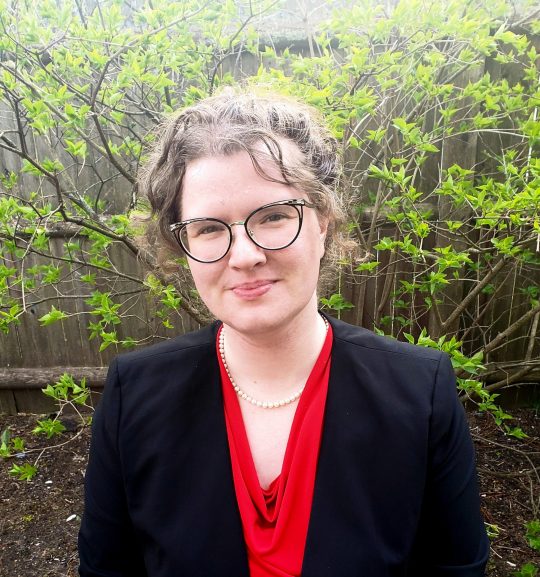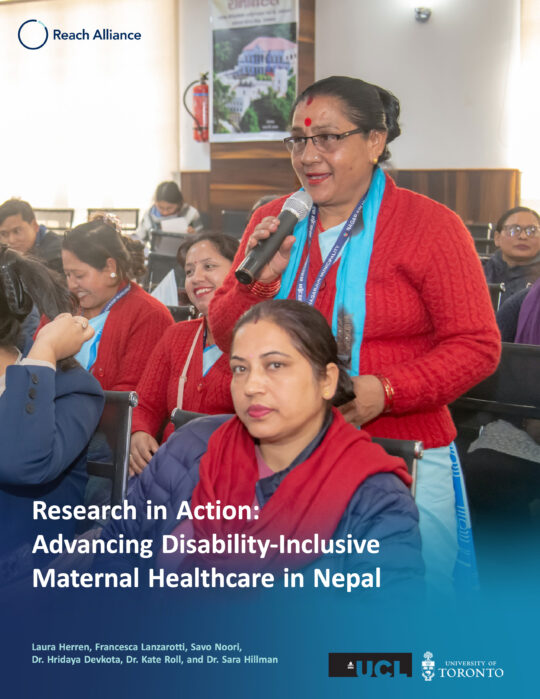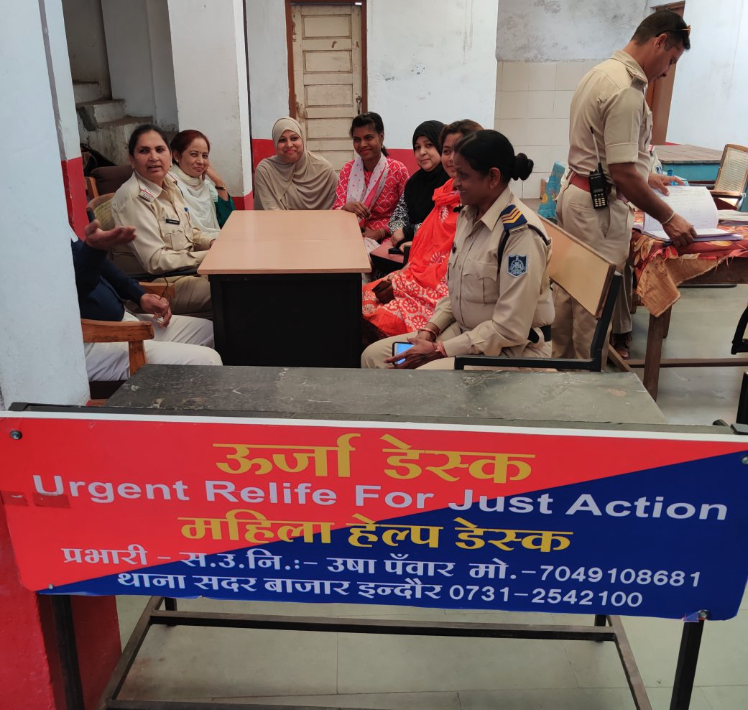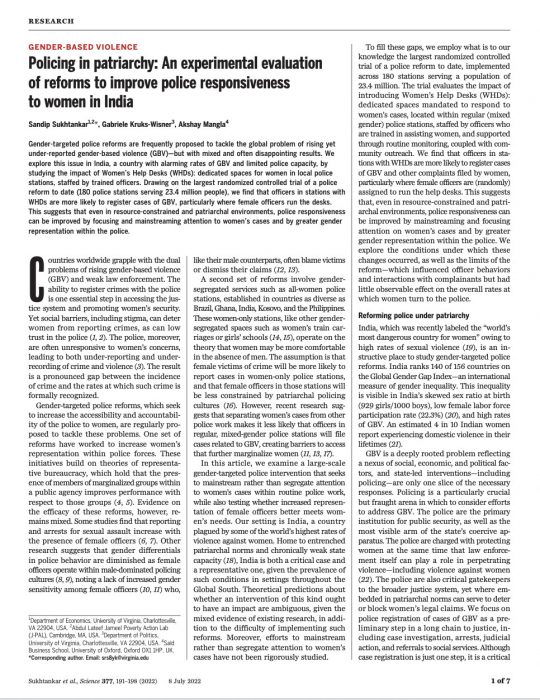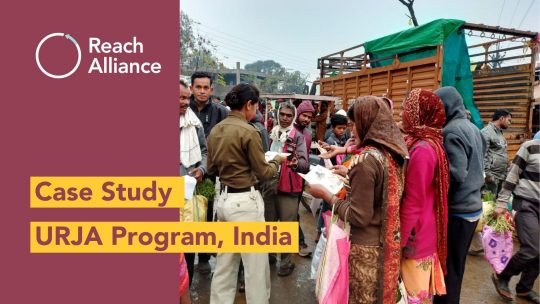Executive Summary
Violence against women is a global public health problem, but an especially severe problem across India. This case study examines a recent police reform intended to increase responsiveness to violence again women — Urgent Action and Just Relief (URJA), which piloted in the Indian state of Madhya Pradesh. URJA is a multifaceted intervention bundling together four reforms — the creation of physical help desks intended to assist women at the first point of contact with police; the allocation of greater numbers of female officers to URJA desks; the creation of standard operating procedures for police officers treating crimes against women; and community outreach to publicize the new approach to treating crimes against women.
URJA shows initial promise in effectively introducing a system to handle crimes against women. Key obstacles to its effective implementation were disruptive police schedules and staffing, a lack of clarity about officer responsibilities and uneven officer motivation to engage with the reform. Officer training, but especially senior-level officer involvement, was pivotal to ensuring URJA success because senior officers possess the authority to affect the behaviours of lower-ranked officers. The introduction of standard operating procedures (SOPs), combined with gender-sensitivity training, helped to target the socially learned gender prejudices of the police. And the creation of a dedicated physical space symbolized safety and a visible prioritization of crimes against women. The allocation of female officers to the help desks had an additional demonstrable impact evident in heightened crime registration. Based on our case study, we recommend the further rollout of URJA, the broad institutionalization of gender-based police training and further investment in financial and human resources for the Gender Resource Centre that could amplify the program’s momentum.
Context: Violence Against Women Worldwide and in India
Thirty percent of women worldwide will be subjected to some form of violence in their lifetime.1 Pervasive violence against women is a global public health problem and an inherent violation of human rights. Making progress on the United Nation’s Sustainable Development Goals (SDGs), especially toward the goals of Gender Equality (#5) and Peace, Justice and Strong Institutions (#16), requires various kinds of reform to address systemic sources of violence.
Police reforms will necessarily be at the institutional heart of advancing these SDGs. Police represent a victim’s first interaction with a state’s justice system and thus assume a particularly large role in advancing women’s rights. The challenge of addressing gender-based violence is exacerbated when police interact with the most disadvantaged and “hardest to reach” communities who by definition disproportionately lack access to quality policing. Compounding a lack of access is a lack of trust in the police by historically subjugated communities.2 A lack of trust can create a negative feedback loop where victims of violence do not go to the police because they anticipate a lack of support. And because victims don’t report crimes in these instances, the police cannot act to support victims. Globally, it is not surprising that the rate of reporting crimes against women is low. A fear of social retaliation, shame, stigma and low conviction rates for perpetrators all combine to discourage police reporting.
Gender-based violence and low levels of trust in police forces are an especially pervasive and significant problem in India, one of the most dangerous countries in the world for women.3 Multiple, interacting factors make policing reform a particularly intractable problem there. Traditional gender hierarchies make gender-sensitive policing a low political priority; cultural norms often challenge women when they report gender-based violence and even when victims approach the police, they find that police can be reluctant to intervene in what they think of as a community issue.
The Indian police force is itself affected by many of the same challenges as the communities it is meant to serve. Chronically underresourced, officers work long hours in tough conditions and are rotated to different stations and different departments. These factors combine to make any reform efforts difficult to initiate or sustain.
The current drive for gender-sensitive police reform began when the political context of women’s security changed in 2012 following the highly publicized gang rape and murder of a young woman in Delhi. The story became known as the Nirbhaya case. In response to public pressure, high-profile policy efforts were implemented in the country to strengthen the laws around sexual violence and improve police responsiveness to crimes against women. In 2013, India implemented a tougher anti-rape law, the Criminal Law Amendment Act, which punishes sex crimes and imposes harsher punishments for rape. Along with national laws, some significant new services were implemented across the country: women’s helplines were established, all-women police stations expanded and “Nirbhaya” police patrol vehicles were introduced.
The Urgent Action and Just Relief (URJA) program is one example of reform initiatives launched in the state of Madhya Pradesh (MP). More broadly, for example, MP committed to increasing the percentage of women police officers from approximately 10 to 30 per cent.4 URJA’s main objective was to provide primary care and support to women victims of violence in their first interaction with the justice system. URJA is composed of multiple interventions aimed at providing policing to the hardest to reach. It
- provides a separate physical space for women victims in police stations;
- standardizes both the process for attending to victims and police officer training in these processes; and
- includes a monitoring system to track and report progress on implementation of the program’s components as well as cases brought forward by women.
The initiative has both “hardware” (physical resources) and “software” (behavioural procedures and training) components to reform these cases’ policing.
Research During a Pandemic
Because our team completed this fieldwork during the COVID-19 pandemic, we could not travel to India to conduct in-person research. We therefore observed help desks over video calls. With our fieldwork bound to virtual interviews, our capacity to develop connections with police officers was restricted. Additionally, because of police involvement in managing the response to rising COVID-19 cases in India in April and May 2021, the interviews were delayed when the police had other urgent demands on their time.
Another challenge was that we were able to interview only those stakeholders the police recommended, which perhaps limited our ability to hear contrasting points of view from those involved in URJA. However, the virtual interviews did make it possible to speak with a range of officers and other stakeholders involved that would perhaps not have been possible previously.
Figure 1. Map highlighting Madhya Pradesh, India. (Source: Wikimedia Commons)
Policing in Madhya Pradesh
A colonial-era law lies at the base of India’s police force — the Police Act of 1861. With its hierarchical and often rigid structure, the law had no provisions to address crimes relating to women. Since India’s independence in 1947, police reform efforts have largely centred on law and order and addressed large-scale collective violence to the neglect of everyday crime prevention and investigation. Historical inattention to crimes against women combined with cultural practices, social norms, political priorities, economic considerations and other institutional factors make it difficult for the police to implement or sustain institutional reform. While new officers can sometimes receive updated training, most officers receive no on-the�job training. According to India Justice Report, just 6.4 per cent of the police force had received in-service training between 2014 and 2019.5
Madhya Pradesh (MP) is a below-average state in terms of development. Situated in northern central India (see Figure 1), MP is India’s fifth�largest by population with 72 million people.6 It is home to a considerable number of groups with low socioeconomic status, or scheduled castes and scheduled tribes in India’s context. Its diverse culture and extensive geography have often curtailed mainstream development and economic progress: the SDG India Index 2020–21 ranked MP 17 out of 28 states on Sustainable Development Goals progress.7
Madhya Pradesh faces a broad range of policing challenges. In a 2019 India Justice Report, the state’s justice institutions were ranked ninth out of 18 large and mid-sized states, based on the functioning of its police forces, prisons, judiciary and legal aid systems.8 It ranked MP’s police force 15th out of 18 large and mid-sized states, evaluated with respect to police training, diversity of personnel, filling vacant posts and share of women police offices.9 MP’s police find it difficult to provide public services to the most vulnerable, such as those living in rural areas, tribal populations and lower castes, not to mention more general challenges in the justice system.
Figure 2. Police-to-population ratio across Indian states (officers per 1,000 population). (Source: Bureau of Police Research and Development, 2018; Census of India, 2011)
As it is in other states across India, the state’s police force is characterized by a strong hierarchical structure, top-down flow of communication and little room for lower-level officers to share concerns. The police department also experiences physical resource and human resource gaps and officers must often work extended hours to make up for these gaps. Like many of India’s front-line public services, the police are chronically understaffed: the country’s police-to-population ratio of 1.2 is among the lowest in developing countries. However, as Figure 2 indicates, there is some variation across states. MP performs slightly below the national average, an indication of personnel shortages in its state forces.
Getting Crimes Against Women Reported
The first challenge to providing effective policing support to female victims of violence is to ensure the crime gets reported in a context of pervasive underreporting of crimes against women. A study on four of MP’s major cities found that a large majority of women who had been victims of violence failed to report to the police. Of the 13 per cent who had experienced intimate partner violence, only 1 per cent reported it.10 Even when crimes were reported, only 18 per cent of police officers in a recent survey reported having received any specific training on crimes against women or gender sensitization, suggesting that police forces are poorly equipped to effectively support victims. A key assessment of any policing reform success is thus whether it leads to police filing an increased number of crimes against women — which would indicate some combination of more women reporting to police and more police responsiveness to filing a report of a crime.
Successful police reforms would thus be likely to lead to greater numbers of either First Information Reports (FIRs) or Domestic Incidence Reports (DIRs). An FIR can be filed by anyone who has information about the crime while a DIR is a report regarding domestic violence specifically. The DIR dictates additional duties for the police and the government agencies that support women. Each type triggers a different process within the Indian justice system and social support services.
Figure 3. Legal process of filing cases in India.
URJA’s Inception
The Madhya Pradesh Police (MPP) have been working on solutions to provide better care for women. In recent years, and especially after the 2012 Nirbhaya case, the MPP has launched initiatives like all-women police stations, a women’s helpline, Nirbhaya vans and even women volunteers to support the police.
URJA was launched in January 2019 through a collaboration between the MP police department and the Abdul Latif Jameel Poverty Action Lab (J-PAL). URJA aimed to tackle issues around women’s safety and to build public trust in the police.11 One of its primary aims was to increase the number of reports of crimes against women, via First Information Reports (FIRs) and Domestic Incidence Reports (DIRs). One of its first steps in this reform involved tackling the discomfort women feel about going to a police station to report violent crimes. URJA’s strategy to combat the underreporting of crimes against women was thus to design an integrated approach for these challenges. A series of reforms was proposed at critical points in the process of police reporting of crimes against women. Each component was designed to meet the specific challenges of interaction between women and policing services.
Figure 4. Four major components of the URJA intervention. (Source: Akshay Mangla, 2020)
Physical spaces within stations mandated to assist women (help desks). Police stations are rarely designed with women’s needs in mind. There are often no women’s restrooms. Women bringing along children find inadequate space for them in traditional police stations because they are attended to in the same physical place where other services are provided. In closed communities or rural areas where everyone knows each other, a lack of privacy to give testimony can significantly deter women’s reporting of a violent crime. With that in mind, URJA created exclusive spaces for attending to women.
Figure 5. Inauguration of URJA program in Bhopal, MP. (Source: Akshay Mangla, 2020)
The intervention created physically separate help desk rooms with chairs, spaces for children, water and tea, and bathrooms for women. In one police station we visited virtually, there were informational posters on the walls with images and instructions in different languages on women’s rights and how to proceed in the event of violence. A sign with telephone numbers of the police officers responsible for the service exhibited the officers’ intention to create bonds of accountability and proximity to the community. Appointments are made confidentially, which encouraged women to go to the police station and tell their stories. Figure 5 shows one such desk.
Standard operating procedures (SOPs). Women who try to report crimes can be discredited by police who sometimes believe that women may give false reports. In other cases, police officers simply do not take the complaint seriously enough to pursue it. Bearing in mind the need for cultural and procedural change, URJA designed a training program urging the adoption of specific SOPs to treat gender violence, including a model for ongoing training. The SOPs have two components: content on gender awareness and content on reporting procedures. They were introduced and reinforced through a training program that includes repeated rounds of local-, district- and state-level training. The program also has a monitoring and support component carried out by senior officers, making it an ongoing effort rather than a one-off event.
Outreach program aimed at local women’s networks. The third significant challenge involved integrating the program with the community. In many cases, police stations are seen as detached from the local reality and women do not feel heard. Aiming to socially embed the URJA desks within their surrounding communities, the URJA outreach program created regular connections between officers and local institutions such as daycare centres and women’s self-help groups. Several URJA community advisory groups, whose members act as liaisons between the police and the broader public, were also created.
Figure 6. URJA community outreach activities in Indore, MP. (Source: J-PAL research team, 2019)
Additional female officers allocated to URJA desks. A final problem in implementing police services for women is the entrenched social norms that stigmatize women. It is common to hear reports of women who do not feel well cared for by (the mostly male) police officers, who may lack understanding or empathy for female-specific needs. Accordingly, the MPP adopted a mandate (prior to URJA) to increase the recruitment of women officers, setting a 30 per cent target for women among new recruits. Evidence indicates that having female police officers present at the URJA desks is associated with increased registration of crimes against women — a key indicator of better results in addressing women’s demands for justice. A recent study indicates that having women on the front line of a URJA help desk increased DIR filing.
Figure 7. The URJA pilot and expansion timeline. (Source: “MPP Implementation Report,” 2020)
Routine monitoring of implementation. After the pilot, MPP and J-PAL researchers noticed that help desk officers were often transferred to other police stations. The subsequent turnover and staff shortage had a negative impact on operations. As a result, the MPP and J-PAL designed an internal monitoring system to mitigate these impacts. Senior-level officers used this monitoring system to oversee and manage help desks’ activities and reviewed it monthly. For example, a senior officer reported that she receives daily situation reports and monitors them with information on gender�based-violence cases from the 12 pilot districts. If help desk officers are newly posted in a station or transferred, it is reported at the monthly meetings. Now, officers who are interested in monitoring will be posted at a resource centre that aims to bridge police, academia and civil society. Instead of being a separate component, routine monitoring is an integral process that cuts across the URJA program and helps ensure that implementation targets are met.
These four pillars of URJA were piloted in two districts of MP in 2018 before being expanded to twelve districts in 2019.
Learning from Implementation Challenges
In MP and India at large, police officers experience high stress levels, long working hours and heavy workloads. Officers are often inundated with multiple responsibilities that are not related to policing duties. For example, URJA’s program launch initially had to be delayed because state and national elections in MP required regular policing work and URJA became a low-priority task in comparison. Bearing this context in mind, we learned that initial implementation encountered some significant challenges.
Disruptions in Schedules
Police officers have heavy workloads so are often unable to participate in training sessions. This also makes it difficult for master trainers to schedule sessions because it is difficult to coordinate and obtain a critical mass of participants. To circumvent this, training is kept flexible, with follow-up sessions conducted at a smaller scale, where necessary. Master trainers are also required to plan a monthly schedule of training sessions, which is shared with district coordinators. This system means police officers and trainers alike are held accountable to work around disruptions, respectively attending and arranging training sessions.
Lack of Integrated Staffing
URJA help desks were primarily overseen by the desk officer, with little support from other police station staff. This meant that there was little continuity if desk officers were on leave. To address this gap between the URJA help desk and the police station, subsequent training sessions sought to strengthen the link between the routine work of station staff and help desk activities. Notably, training was eventually geared toward increasing involvement of all police station staff, instead of only those who were involved with the help desk.
Lack of Clear Roles and Responsibilities
Most officers had a vague understanding of what URJA was meant to achieve or of their respective responsibilities. This lack of clarity had trickle�down effects on their motivation levels, not just in terms of executing their roles, but also in internalizing training materials. To address this, higher-ranked officers were brought in to communicate the purpose and vision of URJA to relevant stakeholders. Since hierarchy features prominently in policing culture, senior officials’ involvement also meant that junior police officers were incentivized to treat URJA seriously.
Lack of Officer Motivation to Engage with URJA
URJA is perceived as a desk job that is less glamorous than field work. Many police officers also have deeply ingrained prejudices regarding gender-based violence, such as the tendency to perceive women’s cases as false or less serious than men’s. Such attitudes and perceptions weaken the likelihood that women’s cases will be heard, let alone registered. For officers with these views, participating in training sessions was consequently a low priority. In this regard, senior involvement was helpful in incentivizing officers to take URJA seriously. Their approach to training also helped, as officers are invited to unpack their prejudices together, which helped to build receptiveness and by extension, motivation toward URJA.
Monitoring and Learning from Best Practices
Prior to URJA implementation, most districts and police stations operated independently, with little communication or information exchange. Districts where senior officers were more proactive tended to do well in implementing URJA, while others lagged. To circumvent this unevenness, the team set aside one dedicated training session that enabled officers across the state to share best practices from well-performing stations.
Insights from URJA’s Training
Training is a Critical Factor for URJA Success
Citizens and police officers alike have learned to tolerate domestic violence. While training aims to initiate a gradual unlearning of patriarchal behaviours, gender biases are still very much embedded in Indian domestic violence law — legal outcomes are often still detrimental to women victims.12 Police regularly opt to resolve domestic violence cases using informal methods, such as reconciliation or encouraging the woman to be a “good wife.” Legislation and enforcement around gender issues uphold the traditional social norm that women ought to submit to their male partners. To intervene in these social and cultural norms informing police conduct, training is essential.13 Gender sensitization encourages a sympathetic handling of cases related to women, and standard operating procedures (SOPs) serve as a tangible way to change police officer behaviours regarding gender-based violence.
In URJA, SOP training equips the officer with tools to handle domestic violence disputes — seemingly simple guidelines that put clear end�to-end processes in place. The SOPs assure that the processes percolate from the state level to the station level — the crucial grassroots area.
Conducting Trainings
In partnership with the MPP, a J-PAL team, legal experts and civil society organizations with gender expertise developed the SOPs in 2017. These SOPs have enough detail to guide an officer to operate a help desk, and the gender-sensitization training was designed to provide context for the SOPs. The training program on SOP content was implemented in a six-month-long pilot program in two districts before the program was expanded to 12 districts and 180 police stations in March 2019. They included instructions to carry out gender-sensitized first response (at a desk, as well as in community outreach and referrals) and monitoring and functioning of the desks. These SOPs were reinforced through a training program with a cascading model and participation through all ranks.
Figure 8. The cascading model. (S. Bhattacharya, M. Tikku, and S. Chandrashekhar, “MPP Implementation Report,” 2020)
Senior Officer Involvement through the Cascading Mode
The cascading model involved multiple rounds of training each designated for district-, local- and station-level training that would enable officers on the ground to understand and apply the SOPs appropriately. Four rounds of training were conducted. The benefit of such a model was that it bolstered buy-in and alignment from all levels of the police, from district-level seniors to the station-level front-line officers. The station-level training, led by the district master trainer, was repeated monthly to impart URJA desk functions, procedures and documentation processes on a regular basis. Master trainers were the key to the cascading model’s success because they were responsible for conducting station-level training for all police stations, cutting across multiple hierarchies.
In addition to a master trainer, a newly formed women’s help desk district coordinator role championed the intervention to manage the training and support the help desks. The J-PAL research team initiated the trainings for master trainers who were also responsible for conducting station-level trainings. As so many new roles and responsibilities were introduced through URJA, senior officers were critical in maintaining order among their officers and emphasizing the importance of executing the intervention appropriately.
Figure 9. The experiential learning cycle in police training. (Bhattacharya, Tikku, and Chandrashekhar, “MPP Implementation Report”)
As an experiential learning method, the format of the trainings included the use of case studies and role playing. Case studies introduced new perspectives and illustrative examples and gave police officers a space to speak their mind. Role playing encouraged participation and retained knowledge.
The training program was designed to be intensive, with multiple training sessions over a short period of time. The high frequency and long duration of the training program were intended to reinforce the gender-sensitization concepts and SOPs. The intensity and multiple levels of the training aimed to harbour sustained changes in behaviour that could not otherwise be achieved with one isolated training.
Figure 10. Training time line. (Bhattacharya, Tikku, and Chandrashekhar, “MPP Implementation Report”)
Reporting Crimes Against Women
One of the crucial processes that the SOPs sought to address was improving the ease of filing First Information Reports (FIRs) and Domestic Incidence Reports (DIRs). In addition to formalizing a step-wise routine on how to treat a woman’s complaint when she visits a help desk, the SOPs also formalized reporting crimes against women. These reports detail the initial registration of crime cases by the police, usually filed by crime victims at police stations. The FIR allows the police to arrest without a warrant, and the combination of the FIR and DIR makes it possible for police to investigate the case. Training officers to register FIRs and DIRs was a core element to the URJA’s success by reporting crimes against women and providing legal services to support women victims.
Main Challenges of Training
Introducing an intervention that overturned cultural norms and how officers dealt with gender-based cases in a police force with gruelling working conditions naturally met with challenges. In 2019, Tata Trust noted that in Madhya Pradesh, police officers on average worked 14-hour days and stations were short staffed. The report also noted low morale in front-line officers, the social distance and hierarchical distinctions between senior and front-line officers and low levels of community policing.14 In addition to the difficulties in station-level operations, political motivations add further organizational complications. Front-line officers may get transferred for political reasons, weakening police motivation and organizational coherence.
Training all officers in the URJA help desk. With the irregularity of police duties, there were often disruptions to URJA trainings caused by festivals, dates of national importance and other unpredictable incidents. These frequent interruptions affected participation in training. Often, officers could not attend the full training because of other urgent responsibilities. Although it was usually possible to reschedule training to another date, and the training quality was not compromised, this put strain on the master trainer who had to lead more training sessions than originally planned.
No official help desk officer. Although desk officers spoke of the sustained knowledge from the trainings, not all of a station’s police officers are trained in URJA duties, and there is currently no dedicated staff to support URJA. The Madhya Pradesh Police Implementation Report15 and our interviews revealed this was a major challenge in maintaining the help desks. Managing the desk is additional work to officers’ typical duties, and the help desk is left unattended if an officer is interrupted by other responsibilities. Women victims are unable to speak to anyone else for assistance. Depending on the station and day, these disruptions can be frequent. The workaround devised at the time of the training program was to keep URJA�trained officers at their posts, but a longer�term solution has yet to be implemented.
Knowledge gaps caused by transfers of help desk officers. Police officers are regularly transferred out of their stations or districts and trained officers are often moved elsewhere with no replacement to the original help desk. Sometimes the opposite also occurs, and trained officers are sent to districts without a help desk in place yet. To address this challenge, monthly meetings in the districts were conducted to monitor the officers who were trained and subsequently transferred, and vice versa. This mitigated loss of knowledge and ensured that the right person was trained. Holding regular station-level trainings was intended to overcome the knowledge gaps caused by transfers, but logistical challenges remained since master trainers were also frequently transferred, resulting in the biggest institutional knowledge loss. As a short-term solution, senior district officers refrained from transferring URJA-trained officers out of their districts.
Motivating police officers. Because gender�based policing is considered a low priority and a cause for additional responsibilities or paperwork, many officers, especially lower-ranked ones, did not view URJA favourably. Researchers and officers observed a variety of gender biases. Some officers have fixed patriarchal views on gender-based violence (their mentalities are difficult to change), some recognized the issue of violence against women prior to the intervention and some had no preconceived notions and responded well to the training.
The MPP Implementation Report, published in December 2020, observed that station-level trainings suffered when master trainers lacked motivation or interest in the issue of gender-based violence. The officers interviewed who saw URJA as a success had lived experiences of domestic violence or were open to learning new perspectives. Those officers who were more receptive to new ideas and concepts were often newer in the police service. These varying levels of motivation dictate how well the training led to effective implementation of the help desks.
Lessons for State-Wide Expansion
Integrating women’s help desks in every police station’s routines improves policing for women
Unlike approaches such as women-only police stations where there is a complete separation between police stations dedicated to general crimes and gender-based violence, URJA created a separate space to serve women at traditional police stations. This approach has major advantages for the individual woman. It allows greater access to the service as a result of the safe space it creates and saves time and resources when it comes to victims travelling to a women-only police station — accessibility issues that are crucial for the poorest. For the greater goal of tackling crimes against women, URJA increases accountability on women’s issues for all members of the police force and increases their capacity to handle these issues by training officers in all of a district’s police stations.
URJA shows initial promise in effectively introducing a system to handle crimes against women with a training program composed of two interlinking parts: (1) physical spaces to ensure confidentiality and comfort and (2) training to modify unsupportive behaviour patterns. These components together help tackle the traditionally paternalistic treatment of women victims by the police. The physical infrastructure made available for women victims and police officers allowed victims to confidentially confer with police officers in training. When senior officers were also involved, the results were changed conditioning and treating gender-based crimes with a more empathetic and victim-based approach.
Involvement of senior officers is crucial in both creating the physical help desks and sustaining the change to become a more gender-sensitive police force
Creating a physical help desk. The creation of new physical spaces in the form of help desks for women both signalled and to some degree created a change in policing crimes against women. Police budgets typically underinvested in physical infrastructure. The Status of Policing in India Report 2019 noted that state budgets for training are often underutilized and that even when expenditures are made, training reaches only a small portion of the police force. Indeed, the Madhya Pradesh Police Implementation Report of 2019 acknowledged that most precincts would benefit from more flexible police budgets.
The construction of help desks that were required to have toilet facilities, a comfortable seating arrangement, trained officers who offer water to the survivors when they visit and informational posters exhibiting the names and contact numbers of all officers all signalled a change. The dedicated physical space symbolized safety, willingness to listen and a visible prioritization of women’s issues. The physical infrastructure was a nontrivial undertaking that senior officers carry out, involving funding, construction, and procurement. The act of securing a budget to create the physical spaces for URJA signals senior officers’ new commitment to enacting a cultural shift in how the police operate.
Officers noted that the privacy afforded by the space as well as small touches — URJA posters on the wall — seemed to encourage women to speak more freely and that women come forward following word-of-mouth recommendations.
Senior officer involvement. A key finding in both the Madhya Pradesh Policing Implementation Report and our interviews was the pivotal influence of senior-level officers in making URJA successful. Because the inception of URJA was led by a deputy director, there was a high degree of senior management support. The Implementation Report noted that the presence of district-level senior officers in trainings gave the training program momentum and signalled high-level commitment. Superintendents who recognized the costs of crime against women to an egalitarian society were more dedicated to executing the appropriate trainings. For example, when the director general discovered that one of the policing districts had underperformed on some URJA implementation parameters, he communicated with the district inspector general, and implementation improved dramatically. Districts without such commitment from their senior leaders were generally less effective in raising the number of FIRs and DIRs that were key to successful reform.
Our interviews with senior officers showed that they had the authority to affect the behaviours of lower-ranked officers during the URJA intervention in a variety of ways. When senior officers either directly communicated the importance of URJA to individual officers or more subtly communicated commitment, such as through aiding with a help desk’s set�up or visiting the help desk, it had a direct impact on motivating lower-ranked officers to diligently carry out URJA’s standard operating procedures (SOPs). URJA was most successful when senior officers were directly involved in its implementation because their involvement created pressure for more junior police officers to correctly carry out the variety of help desk duties.
Senior officers could also motivate by recognizing high-performing stations with commendations or cash rewards. They did this by ranking district performance against the URJA standards and tracking high-performing districts. Because gender-based policing was not perceived as prestigious work, such rewards created tangible incentives for officers to prioritize domestic violence issues. Researchers and officers agreed that more incentives can not only boost help desks’ performance but also attract new officers to dedicate more attention within the existing units to gender-based crimes.
Standard operating procedures must complement gender�sensitivity training
URJA was an intervention intended to change the complexities of a deeply embedded police culture. The introduction of SOPs, combined with gender-sensitivity training, intervened in the socially learned gender prejudices of the police.
Gender sensitization. The gender-sensitization training was especially necessary for police officers who had never heard of the concept. Although it was met with varying degrees of skepticism, some officers appreciated that the gender-sensitivity session gave them space to share their thoughts about the issue, regardless of their perspectives. A few noted that they used to be afraid when women approached the police station, and some felt they came out of the training more empathetic of the challenges women faced. The purpose of gender sensitization was to develop empathy in police officers who were unfamiliar with or had anxiety dealing with domestic violence crimes and cases.
Figure 11. URJA training and implementation in Morena, MP. (Source: J-PAL research team, 2019)
SOPs intervene in gender biases. In the past, social perceptions stood in the way of effectively addressing crimes against women in a traditionally patriarchal society. Policing reforms were historically unsuccessful in part because gender-sensitive policing faced prejudice from officers. Whether or not officers viewed URJA as a positive intervention, SOPs provided simple and clear steps for officers to follow, removing any ambiguity over how to serve female victims. Legal experts noted that standardizing certain actions, such as offering water to the victim and listening to her account, helped police officers modify their behaviour. SOPs have the additional benefit of being hierarchy and gender agnostic. Regardless of whether the officer believes the woman’s complaint is false, they are lawfully obligated to follow the SOPs. Because victim�centred policing, or being sensitive to the victim’s needs, is still a new approach for the MP police force, the introduction of concrete and specific procedures is the first step in nudging the police officer to adopt new attitudes and behaviours.
A helpful toggle between SOPs and gender�sensitivity training. Although gender-sensitivity components were included in the training program as well as the SOP training, the MPP and researchers removed or reduced these elements when they felt officers were not grasping the concepts and toggled to more focus on teaching adherence to SOPs, which were more directive and effective in altering behaviour. Senior officers we interviewed noted that gender�sensitization training has been conducted for over thirty years with little effect. On the other hand, removing the gender concept entirely was detrimental, since SOPs and processes make little sense without the gender context.
These findings suggest that both gender�sensitivity and SOP training are equally important components but must be balanced appropriately depending on the officers’ backgrounds. The main decision makers found it was effective to adjust the amount of gender-sensitivity training in real time, which underscored the need for trainers to constantly monitor officers’ reactions during an intervention to identify and adjust for the optimal balance of training components.
Monitoring: To sustain a behaviour change, repeated interaction among all hierarchies must occur to improve and resolve challenges in the early days of the intervention and beyond
Early on, monthly monitoring meetings assessed whether trained officers were expected to be transferred and were crucial in assigning the appropriate officers for training and work at the help desks. These meetings also served as a place to resolve escalations relating to URJA, and to track variations of program performance in different districts. Monitoring has the potential to become a resource open to police of all hierarchies, as well as to civil society and academics who all have a stake in fighting crimes against women. The vision is for these monitoring events to serve as a think tank for all these stakeholders to improve on the initial intervention.
Policy Recommendations
Institutionalize Training for Gender-Based Policing
Training has had a substantial impact on the URJA implementation. It has helped the police administration in inculcating a culture of gender sensitization, empathy to survivors of violence and adherence to SOPs. The training process needs to be institutionalized by:
Regular updates of training content. Content for the URJA training program was developed through partnership between the police academy, civil society organizations, domain experts, serving officers and research partners. As the program is about to be scaled up, there is also a need to learn from past experience and appropriately tailor the content. During URJA piloting, many facets of the laws relating to violence against women have been amended or modified. Widen focus from registration of crimes to investigation and conviction. The initial phase of URJA emphasized increasing the reporting of crimes against women. As URJA is now set to be expanded to the entire state, it will become appropriate to reform other elements of the criminal justice system, namely investigation, effective judicial presentation, and conviction. This requires incorporating additional training components involving witness/survivor protection as well as better investigative practices and case laws.
Expand the cohort of master trainers. Two master trainers per district were trained for the URJA pilot. Our research suggested that the availability of master trainers was a constraint. Future programs need to enlist more master trainers and continually support their training.
Plan and implement URJA training for all field-level officers in the state as the program expands. This would also enable staff rotation between URJA help desks and other policing duties within police stations, which would be important for maintaining coverage of help desks and other duties.
Figure 12. URJA help desk at work in Bhopal, MP. (Source: J-PAL research team, 2019)
Invest Financial and Human Resources in the Gender Resource Centre
URJA had many officers who were hand-picked to lead the program and it is evident that they served as champions for the initiative. The government may think about inducting a few of the URJA champions into the resource centre to amplify the program’s momentum.
Interdepartmental coordination. URJA has been an example of interdepartmental coordination. This must be further strengthened by encouraging interaction with other agencies working for the safety of women both within and outside the government. Beyond the routine channels of communication between different departments, novel platforms can be created to enhance interaction between different agencies, such as multi-agency training programs. For example, training on effectively combatting domestic violence can be conducted for police, protection officers, prosecution officers, staff representing legal aid and civil society organizations working in that jurisdiction.
Police-citizen interface deserves special mention in this regard. Involvement of women’s volunteer groups women (shakti samitis) has not really taken off in pilot districts except in Indore. These samitis, if encouraged, can become a valuable partner for the government in general and police, not just taking URJA forward but also preventing violence against women.
Acknowledgments
This research was made possible through the Reach Alliance, a partnership between the University of Toronto’s Munk School of Global Affairs & Public Policy and the Mastercard Center for Inclusive Growth. This research was completed by researchers at the University of Oxford’s Saïd Business School and Blavatnik School of Government, members of the Reach Alliance.
The Reach Alliance is also funded by the Roz and Ralph Halbert Professorship of Innovation at the Munk School of Global Affairs & Public Policy. We express our gratitude and appreciation to those we met and interviewed, notably the police officers and senior leadership of the Madhya Pradesh Police Department. In particular, we thank Anuradha Shankar and Vineet Kapoor for facilitating our research and providing helpful guidance.
The empirical research this case study is based on received approval from the Ethics Review Board at the University of Oxford.
MASTERCARD CENTER FOR INCLUSIVE GROWTH
The Center for Inclusive Growth advances equitable and sustainable economic growth and financial inclusion around the world. The Center leverages the company’s core assets and competencies, including data insights, expertise, and technology, while administering the philanthropic Mastercard Impact Fund, to produce independent research, scale global programs, and empower a community of thinkers, leaders, and doers on the front lines of inclusive growth.
MUNK SCHOOL OF GLOBAL AFFAIRS & PUBLIC POLICY
The Munk School of Global Affairs & Public Policy at the University of Toronto brings together passionate researchers, experts, and students to address the needs of a rapidly changing world. Through innovative teaching, collaborative research, and robust public dialogue and debate, we are shaping the next generation of leaders to tackle our most pressing global and domestic challenges.

